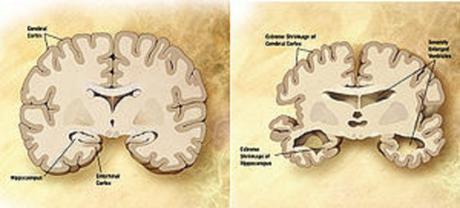Of late, I’ve been spending a lot of time visiting an assisted-living home — a lovely, well-maintained facility for elderly people who span the spectrum of physicial and mental disabilities, including those in hospice care.
To my shock, I discovered that a long-time acquaintance, D.V., who was the founder and editor of a Catholic journal, is a resident of the facility — in its Memory Care wing that is separated from the rest of the compound by double-doors because the patients there all have dementia. D.V. is cheerful and in good spirits, but cannot talk, nor does he recognize his family and friends.
Then there is Emily, not yet in Memory Care, but heading that way. Emily has no short-term memory, and repeatedly makes the same request to the dining room staff she’s asked just minutes ago, “Please bring me some crackers for my soup.”
Approximately 7.7 million new cases of dementia are identified every year—which amounts to one new case every four seconds.
The dreaded Alzheimer’s disease is a severe form of dementia which affects as many as 1 in 8 people 65 and older, or an estimated 5.2 million Americans in 2013.
Alzheimer’s causes nerve cell death and tissue loss throughout the brain. As the disease gets worse, brain tissue shrinks and areas that contain cerebrospinal fluid become larger. The damage harms memory, speech, and comprehension.

Diagram of the brain of a person with Alzheimer’s Disease
In its first stages, Alzheimer’s may not be obvious to friends and family because it is normal for people to become a bit forgetful as they age. So how can you tell a harmless “senior moment” from Alzheimer’s disease?
Below are the early warning signs of Alzheimer’s, from WebMD:
(1) Loss of short-term memory: In early Alzheimer’s, long-term memories usually remain intact while short-term memories become sketchy. The affected individual may forget conversations s/he’s just had and, like Emily, repeat questions that were already answered.
(2) Forgetting common, everyday words: Alzheimer’s disrupts speech, so the affected might struggle to remember common words.
(3) Confusion and behavior changes, such as:
- Trouble balancing the checkbook, often one of the first signs of Alzheimer’s.
- Getting lost in familiar places.
- Mood swings.
- Lapses in judgment.
- Poor hygiene: people who were once stylish may start wearing stained clothes and forget to wash their hair.
(4) Sundown Syndrome: Some people with Alzheimer’s get upset when the sun goes down. This tends to last through the evening and sometimes all night long. To ease tension, keep the house well lit and close the drapes before sunset; try to distract the individual with a favorite activity or TV show; switch him to decaf after breakfast.
Don’t Ignore the Signs!
It’s hard to face the thought that a loved one could have this disease, but it’s better to see a doctor sooner rather than later. It may not be Alzheimer’s as the symptoms can be caused by a highly treatable problem, like a thyroid imbalance.
And if it is Alzheimer’s, treatments work best when they’re used early in the course of the disease. Although there’s no cure for Alzheimer’s and no way to slow the nerve damage it causes in the brain, there are medications that appear to help maintain mental skills and slow the disease’s effects. If your loved one gets treatment early on, s/he may be able to stay independent and do their daily tasks for a longer period of time.
There’s no simple test for Alzheimer’s, so the doctor will use the following to diagnose:
- Changes in memory and behaviors of the patient.
- A mental status test, sometimes called a “mini-cog,” or other screening tests can measure the individual’s mental skills and short-term memory.
- Neurological exams and brain scans may be used to rule out other problems, like a stroke or tumor, and they can provide other information about the brain.
Alzheimer’s takes a different path in every person. Sometimes the symptoms get worse quickly and lead to severe memory loss and confusion within a few years. For other people the changes are gradual, taking up to 20 years for the disease to run its course. Most people live 3 to 9 years after diagnosis.
In its late stage, people with advanced Alzheimer’s may lose their ability to walk, talk, or respond to others. Eventually, the disease can hinder vital functions, like the ability to swallow, signaling that this may be the time to switch to hospice care, which provides pain relief and comfort for people with terminal illnesses.
While you or your loved one is still able to make important decisions, make sure s/he sign an advance care directive — a legal document that will help avoid confusion later on if you’re no longer able to state your wishes by:
- Spelling out what you want in terms of medical treatments and end-of-life care.
- Naming someone to make health care decisions and manage finances on your behalf.
Is there anything you can do to lower your chances of getting this disease? Research in this area is ongoing, but diet and life-style (exercise; don’t smoke!) appear to be important. Studies show people who eat a Mediterranean diet rich in vegetables, fish, and nuts and get plenty of physical activity are the least likely to get Alzheimer’s.
See also:
- Frightening: Alzheimer’s can be transmitted
- Smoking is a major contributing factor of Alzheimer’s
~Eowyn

